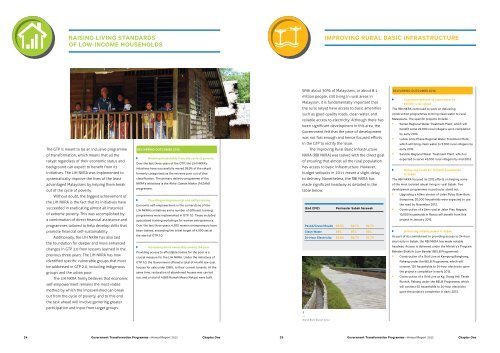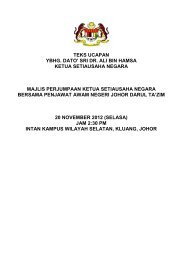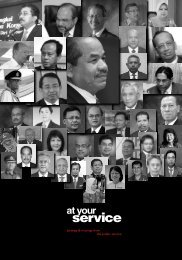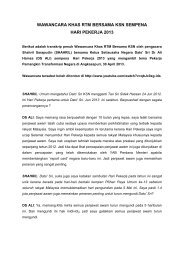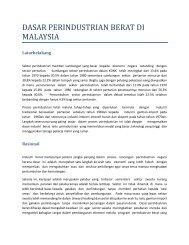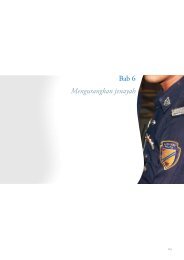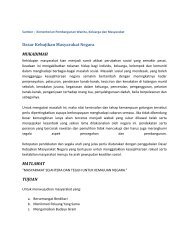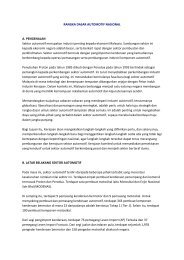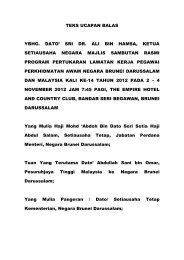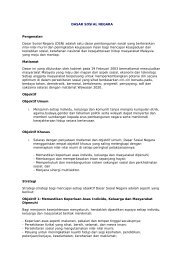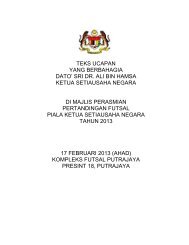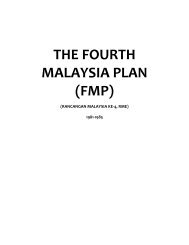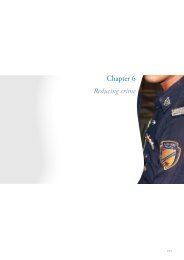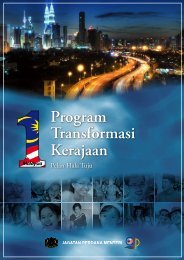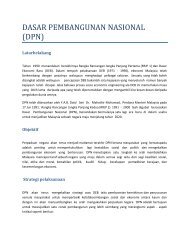GTP 2.0 - Prime Minister's Office of Malaysia
GTP 2.0 - Prime Minister's Office of Malaysia
GTP 2.0 - Prime Minister's Office of Malaysia
You also want an ePaper? Increase the reach of your titles
YUMPU automatically turns print PDFs into web optimized ePapers that Google loves.
RaIsING lIvING staNDaRDs<br />
oF loW-INComE housEholDs<br />
The <strong>GTP</strong> is meant to be an inclusive programme<br />
<strong>of</strong> transformation, which means that all the<br />
rakyat regardless <strong>of</strong> their economic status and<br />
background can expect to benefit from its<br />
initiatives. The LIH NKRA was implemented to<br />
systematically improve the lives <strong>of</strong> the least<br />
advantaged <strong>Malaysia</strong>ns by helping them break<br />
out <strong>of</strong> the cycle <strong>of</strong> poverty.<br />
Without doubt, the biggest achievement <strong>of</strong><br />
the LIH NKRA is the fact that its initiatives have<br />
succeeded in eradicating almost all instances<br />
<strong>of</strong> extreme poverty. This was accomplished by<br />
a combination <strong>of</strong> direct financial assistance and<br />
programmes tailored to help develop skills that<br />
promote financial self-sustainability.<br />
Additionally, the LIH NKRA has also laid<br />
the foundation for deeper and more enhanced<br />
changes in <strong>GTP</strong> <strong>2.0</strong> from lessons learned in the<br />
previous three years. The LIH NKRA has now<br />
identified specific vulnerable groups that must<br />
be addressed in <strong>GTP</strong> <strong>2.0</strong>, including indigenous<br />
groups and the urban poor.<br />
The LIH NKRA firmly believes that economic<br />
self-empowerment remains the most viable<br />
method by which the impoverished can break<br />
out from the cycle <strong>of</strong> poverty, and to this end<br />
the task ahead will involve garnering greater<br />
participation and input from target groups.<br />
DElIvERING outComEs 2012:<br />
breaking households from the cycle <strong>of</strong> poverty<br />
Over the last three years <strong>of</strong> the <strong>GTP</strong>, the LIH NKRA’s<br />
initiatives have successfully moved 99.9% <strong>of</strong> the rakyat<br />
formerly categorised as the extreme poor out <strong>of</strong> that<br />
classification. The primary delivery programme <strong>of</strong> the<br />
NKRA’s initiatives is the Akhiri Zaman Miskin (1AZAM)<br />
programme.<br />
Providing entrepreneurial and skills training<br />
Economic self-empowerment is the cornerstone <strong>of</strong> the<br />
LIH NKRA’s initiatives and a number <strong>of</strong> different training<br />
programmes were implemented in <strong>GTP</strong> 1.0. These included<br />
specialised training workshops for women entrepreneurs.<br />
Over the last three years, 4,300 women entrepreneurs have<br />
been trained, exceeding the initial target <strong>of</strong> 4,000 set at<br />
the start <strong>of</strong> <strong>GTP</strong> 1.0.<br />
Increasing home ownership among the poor<br />
Providing access to affordable homes for the poor is a<br />
crucial measure for the LIH NKRA. Under the initiatives <strong>of</strong><br />
<strong>GTP</strong> 1.0, the Government <strong>of</strong>fered a total <strong>of</strong> 44,416 low-cost<br />
houses for sale under DBKL to their current tenants. At the<br />
same time, restoration <strong>of</strong> abandoned houses was carried<br />
out, and a total <strong>of</strong> 4,865 Rumah Mesra Rakyat were built.<br />
ImPRovING RuRal basIC INFRastRuCtuRE<br />
With about 30% <strong>of</strong> <strong>Malaysia</strong>ns, or about 8.1<br />
million people, still living in rural areas in<br />
<strong>Malaysia</strong>1, it is fundamentally important that<br />
the rural rakyat have access to basic amenities<br />
such as good quality roads, clean water, and<br />
reliable access to electricity. Although there has<br />
been significant development in this area, the<br />
Government felt that the pace <strong>of</strong> development<br />
was not fast enough and hence focused efforts<br />
in the <strong>GTP</strong> to rectify the issue.<br />
The Improving Rural Basic Infrastructure<br />
NKRA (RBI NKRA) was tasked with the direct goal<br />
<strong>of</strong> ensuring that almost all the rural population<br />
has access to basic infrastructure. However,<br />
budget setbacks in 2011 meant a slight delay<br />
to delivery. Nonetheless, the RBI NKRA has<br />
made significant headway as detailed in the<br />
table below:<br />
(End 2012) Peninsular sabah sarawak<br />
Paved/Gravel Roads 98.6% 88.7% 82.7%<br />
Clean Water 99% 87% 86%<br />
24-hour Electricity 99.8% 88.7% 82.7%<br />
1<br />
—<br />
World Bank Report 2012.<br />
DElIvERING outComEs 2012:<br />
Continued delivery <strong>of</strong> clean water to<br />
60,000 rural rakyat<br />
The RBI NKRA continued to work on delivering<br />
construction programmes to bring clean water to rural<br />
<strong>Malaysia</strong>ns. The specific projects include:<br />
• Serian Regional Water Treatment Plant, which will<br />
benefit some 22,000 rural villagers upon completion<br />
by early 2013.<br />
• Lubok Antu Phase Regional Water Treatment Plant,<br />
which will bring clean water to 5,000 rural villagers by<br />
early 2013.<br />
• Saratok Regional Water Treatment Plant, which is<br />
expected to serve 43,000 rural villagers by mid-2013.<br />
Delivering roads for 140,000 households<br />
in sabah<br />
The RBI NKRA focused its 2012 efforts on helping some<br />
<strong>of</strong> the most isolated rakyat living in rural Sabah. Two<br />
development programmes in particular stand out:<br />
• Upgrading a 40km stretch <strong>of</strong> Jalan Pulau Bum-Bum,<br />
Semporna; 20,000 households were expected to use<br />
the road by November 2012.<br />
• Construction <strong>of</strong> a 5km road at Jalan Piau Nagaya;<br />
10,000 households in Ranau will benefit from this<br />
project in January 2012.<br />
Delivering reliable power in sabah<br />
As part <strong>of</strong> its commitment to providing access to 24-hour<br />
electricity in Sabah, the RBI NKRA has made notable<br />
headway. Access is delivered under the Ministry’s Program<br />
Bekalan Elektrik Luar Bandar (BELB Programme).<br />
• Construction <strong>of</strong> a Grid Line at Kampung Bangkong,<br />
Pahang under the BELB Programme, which will<br />
connect 120 households to 24-hour electricity upon<br />
the project’s completion in early 2013.<br />
• Construction <strong>of</strong> a Grid Line at Kg. Orang Asli Tanah<br />
Runtuh, Pahang under the BELB Programme, which<br />
will connect 62 households to 24-hour electricity<br />
upon the project’s completion in early 2013.<br />
24 Government transformation Programme—Annual Report 2012 Chapter one 25<br />
Government transformation Programme—Annual Report 2012 Chapter one


